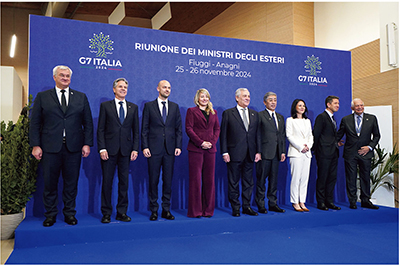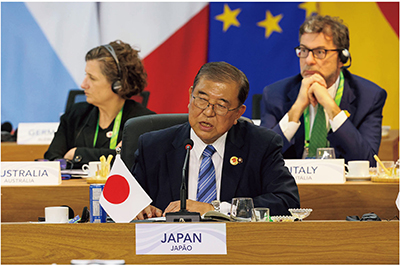Diplomatic Bluebook 2025
Chapter 3
Japan's Foreign Policy to Promote National and Global Interests
3 Leading Discussions at International Conferences
(1) G7
The G7 is united in its response to the various challenges facing the international community. In the face of new challenges such as Russia's continued aggression against Ukraine and the intensifying situation in the Middle East, the two perspectives emphasized at the G7 Hiroshima Summit 2023 ─ upholding a free and open international order based on the rule of law and strengthening engagement with international partners beyond the G7 ─ are becoming increasingly important, and these were carried forward under the Italian Presidency of the G7 in 2024.
At the G7 Apulia Summit held from June 13 to 15, the G7 members discussed issues ranging from Africa and immigration, which Italy had set as its top priority issues as the Presidency, to other issues regarding the regional situations in Ukraine, the Middle East, the Indo-Pacific, as well as economic security, AI, climate change and energy and development. In so doing, the G7 demonstrated its commitment to taking the lead in addressing the challenges facing the international community.(9) Ukrainian President Volodymyr Zelensky also participated in part of the session on the situation in Ukraine.
 G7 Apulia Summit (June 13, Apulia, Italy; Photo: Official Website of the Prime Minister of Japan and His Cabinet)
G7 Apulia Summit (June 13, Apulia, Italy; Photo: Official Website of the Prime Minister of Japan and His Cabinet)In addition, Prime Minister Kishida took into account the results of the G7 Hiroshima Summit held in the previous year, and communicated Japan's position and initiatives as follows.
(a) Regarding Africa, in addition to the importance of expanding cooperation that reflects the expressed wishes of African countries, Prime Minister Kishida stressed that the Partnership for Global Infrastructure and Investment (PGII) and other initiatives should be further promoted along with Africa's needs.
(b) Concerning the situation in Israel and Palestine, Prime Minister Kishida stressed that a ceasefire and an early calming down of the situation are of utmost importance, and that it is necessary to achieve an immediate ceasefire, the release of hostages, improvement of the humanitarian situation, and a lasting ceasefire.
(c) Regarding the situation in Ukraine, Prime Minister Kishida stated that, based on the belief that “Ukraine today may be East Asia tomorrow,” he will continue to strongly promote sanctions against Russia and support for Ukraine. The G7 leaders reached a consensus on the launch of Extraordinary Revenue Acceleration (ERA) loans to Ukraine totaling approximately 50 billion dollars and concurred on measures to implement the ERA loans in October after the Apulia Summit.
(d) As the lead speaker, Prime Minister Kishida comprehensively explained Japan's views on the situation in the Indo-Pacific and emphasized the need to continue addressing issues in this region as a priority issue for the G7. The G7 leaders also reaffirmed that they will continue to work closely together in responding to issues related to China as well as North Korea, including nuclear and missile issues and the abductions issue.
(e) On economic security, Prime Minister Kishida led the discussion by stating Japan's position on addressing economic security challenges, including overcapacity and economic coercion, as well as how to advance international cooperation.
(f) Regarding AI, Prime Minister Kishida emphasized the urgent need to establish governance to promote safe, secure, and trustworthy AI, and stressed the importance of implementing the International Guiding Principles and Code of Conduct developed under the Hiroshima AI Process in the previous year, as well as advancing efforts beyond the G7.
(g) Regarding energy, Prime Minister Kishida stated that it remains important to take an integrated approach to energy security, the climate crisis, and geopolitical risks, without hindering economic growth, and aim for the common goal of net-zero emissions through various pathways tailored to the circumstances of each country. He also pointed out the importance of cooperation with producing countries regarding critical minerals, the demand for which will increase alongside the energy transition.
Under the Italian G7 Presidency in 2024, in addition to the Apulia Summit in June, the G7 leaders held video conferences and teleconferences in February, April, and October, discussing issues such as Russia's aggression against Ukraine and responses to the intensifying situation in the Middle East. In December, a teleconference of the G7 leaders was held to conclude the year of Italy's G7 Presidency.
A total of six G7 Foreign Ministers' Meetings were held in 2024, including those held online. In continuation of Japan's Presidency in the previous year, the G7 ministers engaged with close communication on the situations in the Middle East, Ukraine, and the Indo-Pacific as the main agenda. At the G7 Foreign Ministers' Meeting held in Capri, Italy from April 17 to 19, ministers reaffirmed their commitment to a free and open Indo-Pacific based on the rule of law and concurred on working closely together as the G7 to address the situation in the Middle East. They also reaffirmed their unwavering determination to support Ukraine in its prolonged hardships.
At the G7 Foreign Ministers' Meeting held in Fiuggi, Italy on November 25 and 26, the ministers concurred that it is important for the G7, which shares the same values and principles, to maintain and reinforce cooperation, work closely with many other countries, and firmly uphold a free and open international order based on the rule of law, amid growing division in the international society. Regarding the situation in the Middle East, the ministers discussed the importance of diplomatic efforts to restore stability, as well as cooperation to improve the humanitarian situation, and concurred on addressing the situation in cooperation with the international community. Regarding Ukraine, they concurred on advancing efforts to realize a just and lasting peace in Ukraine. Regarding the Indo-Pacific, the ministers acknowledged that the security of the Indo-Pacific and Europe had become inseparable more than ever, and reaffirmed that relevant countries, including the G7, will continue cooperation to protect a free and open international order based on the rule of law.
 G7 Foreign Ministers' Meeting (November 26, Fiuggi, Italy)
G7 Foreign Ministers' Meeting (November 26, Fiuggi, Italy)Regarding the G7 Trade Ministers' Meetings, the first meeting took place online on February 7, where the ministers confirmed their commitment to the G7 cooperation toward the success of the 13th WTO Ministerial Conference.(10) (See Section 2 (2) A (B).) The second meeting was held in Reggio Calabria, Italy, on July 16 and 17, where they had candid discussions on issues such as maintaining and strengthening a free and fair multilateral trading system with the WTO at its core and ensuring a level playing field (LPF), as well as trade and environmental sustainability, economic resilience, and economic security.(11)
- (9) For details of the G7 Apulia Summit, including the outcome document, see the Ministry of Foreign Affairs website:
https://www.mofa.go.jp/ecm/ec/pagewe_000001_00034.html
- (10) Outcome document of the first G7 Trade Ministers' Meeting, see the Ministry of Foreign Affairs website: https://www.mofa.go.jp/mofaj/files/100618409.pdf

- (11) For details of the second G7 Trade Ministers' Meeting, including the outcome document, see the Ministry of Foreign Affairs website: https://www.mofa.go.jp/ecm/it/pageite_000001_00452.html

(2) G20
The G20 is the premier forum for international economic cooperation participated in by both major developed and emerging countries. At the G20 Rio de Janeiro Summit held in Brazil on November 18 and 19, amid Russia's continued aggression against Ukraine and intensifying situation in the Middle East, discussions were held on important issues facing the international community, such as sustainable development, measures to combat hunger and poverty, global governance reform including reform of the United Nations (UN) and multilateral development banks (MDBs), climate change, and energy transition.(12)
 G20 Rio de Janeiro Summit (November 18, Rio de Janeiro, Brazil; Photo: Official Website of the Prime Minister of Japan and His Cabinet)
G20 Rio de Janeiro Summit (November 18, Rio de Janeiro, Brazil; Photo: Official Website of the Prime Minister of Japan and His Cabinet)Prime Minister Ishiba announced that Japan will actively participate in the Global Alliance against Hunger and Poverty, which is a top priority for Brazil, then-G20 Presidency, and emphasized Japan's intention to cooperate on addressing challenges facing the international community that include climate change, energy transition, the environment, and risk reduction. There are many areas in which the G20 should lead international cooperation, and its role is becoming increasingly important. Prime Minister Ishiba therefore strongly advocated for the need to overcome conflict and foster global governance in which all countries share responsibility, and the G20 Rio de Janeiro Leaders' Declaration included the phrase “share a collective responsibility.” Prime Minister Ishiba also emphasized the importance of a free and open international order based on the rule of law, and clearly asserted Japan's position on Russia's aggression against Ukraine and the situation in the Middle East.
The G20 Foreign Ministers' Meeting was held in Rio de Janeiro on February 21 and 22, with Foreign Minister Kamikawa in attendance. At the meeting, the minsters discussed issues such as how to respond to the situations in Ukraine and the Middle East, as well as global governance reform, including UN Security Council reform. Foreign Minister Kamikawa emphasized Japan's intention to work proactively to realize a world in which the rule of law and human dignity are secured. On September 25, the G20 Foreign Ministers' Meeting was held at the UN Headquarters with global governance reform as its agenda, and a “Call to Action on Global Governance Reform” was issued as an outcome document.
- (12) For details of the G20 Rio de Janeiro Summit, including the outcome document, see the Ministry of Foreign Affairs website: https://www.mofa.go.jp/ecm/ec/pagewe_000001_00001.html

(3) Asia-Pacific Economic Cooperation (APEC)
APEC is a framework of economic cooperation in which 21 economies (countries and regions) in the Asia-Pacific region participate.
The Putrajaya Vision 2040, which outlines APEC's medium- to long-term direction, clearly states that “Our vision is an open, dynamic, resilient, and peaceful Asia-Pacific community by 2040, for the prosperity of all our people and future generations.” Under this vision, the organization is carrying out activities such as liberalizing and facilitating trade and investment in the region, promoting regional economic integration, and engaging in economic and technical cooperation in the region. Japan's active involvement in APEC and promotion of cooperation is of great significance to supporting the country's economic growth and the overseas expansion of Japanese companies.
APEC was hosted by Peru in 2024, and under the theme of “Empower, Include, Grow,” the following priority issues were set and discussed at various APEC meetings: trade and investment for inclusive and connected growth, innovation and digitalization to promote the transition to a formal and global economy, and sustainable growth for resilient development.
At the Leaders' Meeting in Lima, Peru on November 15 and 16, the 2024 APEC Leaders' Machu Picchu Declaration was adopted and called for realizing a free, open, fair, non-discriminatory, transparent, inclusive, and predictable trade and investment environment, support for the rules-based multilateral trading system and WTO reform, and the advancement of women's economic empowerment. Additionally, a Chair's Statement was issued regarding the situations in Ukraine and the Middle East.
At the meeting, Prime Minister Ishiba emphasized the importance of maintaining and strengthening a rules-based, free, open, fair, and transparent trade and investment environment, as well as the multilateral trading system with the WTO at its core, in order to achieve sustainable growth and prosperity in the Asia-Pacific region. He stated that he would further promote WTO reform and high-quality infrastructure investment, as well as the advancement of women's economic empowerment and support for capacity building. He also stressed the importance of formulating international rules through an international framework to achieve data free flow with trust, energy transition toward decarbonization that includes the efforts of the AZEC, and a reduction in food loss and waste in order to foster inclusive growth in the region.
In addition, he noted that Russia's aggression against Ukraine is a clear challenge to the international order based on the rule of law, and expressed serious concern about the further development of military cooperation between North Korea and Russia. He also spoke on the situation in the Middle East, strongly urging all parties involved to exercise utmost restraint and comply with international law.
The ROK will host APEC in 2025.
